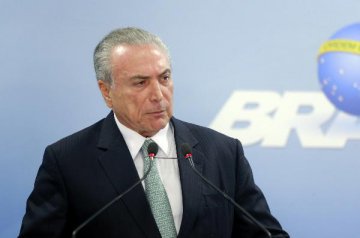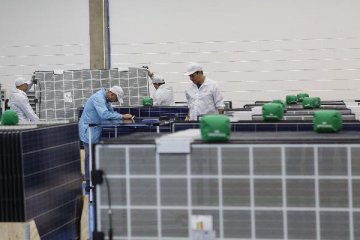Brazil's anti-corruption campaign, called "Cash War", turned much grimmer, as the Supreme Court initiated an investigation on Thursday against President Michel Temer for "corruption and obstruction of justice."
Temer has refused to step down, saying the investigation would show he has done nothing wrong and expressing confidence in the country's ongoing recovery from economic recession.
Brazilian experts said the country needs to walk out of the shadow where the political parties accused each other for corruption, and time and efforts should be spent to resume the country's previous economic glory.
INCUMBENT PRESIDENT UNDER PROBE
On Thursday, Temer encountered another court probe over his alleged arrangement for one of his acolytes to pay a jailed politician hush money to buy his silence.
This is a severe escalation, where the incumbent head of state is officially dragged into the swamp right after Luiz Inacio Lula da Silva, the two-term former president, was questioned over "passive corruption" and "money laundering" on May 10.
"It all starts with entrepreneurs bribing politicians in order to win partiality when bidding for government projects. The embezzled dollars that politicians use for personal spending actually stems from state companies, among them is mainly Petrobras," said Evandro Carvalho, international law professor at think tank Fundacao Getulio Vargas.
Padded contracts from national entities like the country's state oil company Petrobras charged with tapping Brazil's oil and gas resources were awarded to Odebrecht, the infrastructure giant in Brazil and Latin America, according to judicial disclosures and media reports.
In return, as media reports quoted judicial sources and Odebrecht executives as saying, the corporation had funneled 3.3 billion U.S. dollars to politicians between 2006 and 2014, or 80 percent of its net profits over the period.
"Car Wash reveals that all the political parties were involved in graft, including the ruling parties," said Carvalho.
FULL OF CRISES, BUT STILL OPTIMISTIC
Related scandals were basked in bunches and over 100 business people and senior officials have been probed or arrested so far.
Temer himself and his government still appeared to be confident, setting in an overall austerity program with reform of labor law and pension system in efforts to beat the two-year-long recession.
On Thursday in his televised speech, Temer insisted that Brazil's recession was coming to an end and "optimism is returning."
Brazil's unemployment rate hit 13.7 percent in April and the economic growth was widely projected at 0.5 percent for 2017 among various research institutions, though the first quarter growth of GDP this year was declared as 1.12 percent, according to official figures.
Meanwhile, the shadow projected by the anti-corruption battles begins to loom large over the general election to be held in October 2018.
Brazil, the largest economy in Latin America, needs to walk out of shadow of corruption, said Carvalho.
Time and efforts should be spent to resume the country's previous glory in the so-called Golden Decade (1980s-1990s) when economic prosperity greatly enhanced living standards of the people.






















Latest comments